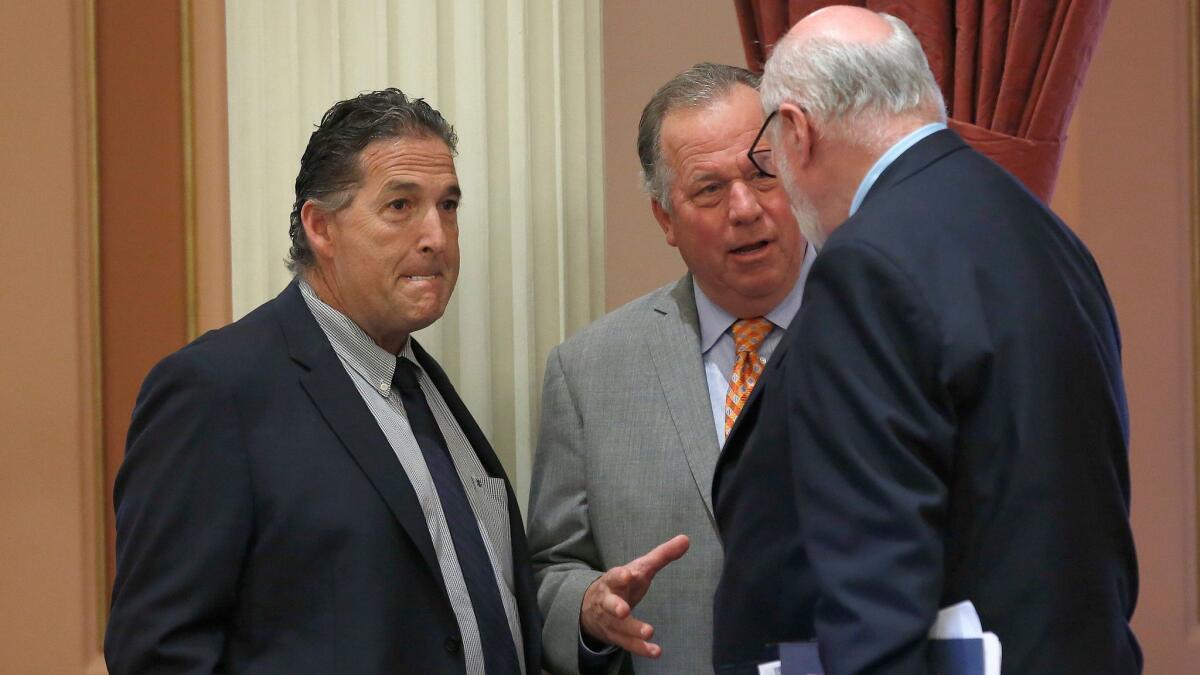California lawmakers want to rein in Wells Fargo’s arbitration clause. But can they?

Quick breakdown of the Wells Fargo scandal.
Long before
Well, they tried, but were turned away by judges citing unfavorable contractual language customers must agree to when doing business with the San Francisco bank.
Now, California lawmakers are working on a new law that could allow such cases to proceed.
But it’s possible that the state plan will run afoul of federal law — or be rejected by the U.S. Supreme Court.
Lawsuits stymied by arbitration
Customers who have tried to sue the bank have been turned away by courts because of arbitration clauses — language found in the fine print of contracts that bank customers signed when they opened legitimate accounts.
Those agreements, which are now found in a wide array of consumer contracts, say that customers will resolve disputes with Wells Fargo in private arbitration, not in court.
Wells Fargo's attorneys have successfully argued that because of the language of the bank’s arbitration agreement, customers cannot sue even over accounts they never authorized.
The strategy, while effective for the bank, has riled consumer advocates and lawmakers who, not wild with arbitration to begin with, see the facts of this case as particularly egregious.
“What's happened is, this bank has used this forced arbitration when they fraudulently set up other accounts with customers,” said California State Sen. Bill Dodd (D-Napa), the lead author of a bill that would aim to end the practice. “I take the viewpoint that those are not legitimate accounts that fall under the terms of the contract.”

Dodd’s solution
Brian Kabateck, a Los Angeles plaintiffs’ attorney who helped write the bill, said customers shouldn’t have to give up their right to sue over accounts they never opened.
“It’s basic contract law: There has to be mutual consent,” he said. “We’re saying, when a phony relationship is set up, you can’t use some other arbitration agreement — one where the parties had a meeting of the minds — and bootstrap it onto a relationship the customer never knew existed.”
The bill was approved earlier this month by a Senate committee and next goes to the full Senate for approval. It also would have to pass the Assembly before making it to Gov. Jerry Brown.
Even if the governor were to sign it, the bill could run into a more daunting obstacle: the federal courts, and the U.S. Supreme Court in particular.
Supreme challenge?
Over the past few years, the high court has issued opinions in a handful of cases involving arbitration clauses, generally strengthening the enforceability of those agreements.
Alan Kaplinsky, a Philadelphia attorney who pioneered the use of arbitration clauses in consumer contracts, said that if Dodd’s bill passes, he believes the Supreme Court would eventually find that the law is in opposition to federal law.
“It clearly won’t stand up,” he said. “Really, there’s no doubt at all that the state law would be preempted.”
The problem, he said, is that Dodd’s bill relates specifically to arbitration agreements. The Supreme Court has ruled that states cannot make rules that treat arbitration agreements unfavorably or differently from other contract terms.
“The court has been really clear that a state cannot single out arbitration for special treatment,” Kaplinsky said.
He pointed to a handful of cases in which the Supreme Court has upheld arbitration clauses that were ruled invalid under various state laws.
In 1996, for instance, the court ruled that a Subway restaurant franchisee in Montana must go to arbitration to settle a dispute with Subway’s parent company, overturning a Montana Supreme Court decision.
The Montana court had found that an arbitration agreement between the parties was not valid because, under a state law, any contract that contained an arbitration clause was required to include a special note on the first page of the contract. The Subway contract included an arbitration clause, but no note.
In an 8-1 decision, the U.S. Supreme Court — with liberal icon Justice
“Courts may not … invalidate arbitration agreements under state laws applicable only to arbitration provisions,” Ginsburg wrote, pointing out that Montana law did not require other contract terms to be highlighted.
The California Chamber of Commerce, California Bankers Assn. and more than two dozen other trade and lobbying groups raised this very issue in a letter opposing Dodd’s bill. The groups argue that, if approved, the bill would lead to years of costly litigation before ultimately being thrown out.
Worth a shot
Dodd said he understands this is a risk and knows businesses will try to get his bill overturned if it becomes law. Still, he said Congress isn’t likely to rein in federal arbitration rules, so it behooves state lawmakers to at least try.
“If it ends up going to court, so be it,” he said. “I have no hope the federal government is going to change any policies under this administration as far as arbitration is concerned.”
Katherine Stone, a UCLA law professor, said it’s hard to say how the Supreme Court might rule but that there’s at least a chance that Dodd’s bill could hold up.
While it’s true that the Supreme Court has generally struck down rules that could be seen as impediments to arbitration, she said, it could be argued that Dodd’s bill promotes arbitration as long as it is consensual.
“There’s where this California bill kind of threads the needle,” she said. “It might stand.”
Rep.
“That would be absolutely valid and have the benefit of helping customers nationwide,” said Sherman, who has introduced a House bill that would do just that.
However, neither his bill nor a matching one introduced in the Senate by Sen.
Follow me: @jrkoren
Inside the business of entertainment
The Wide Shot brings you news, analysis and insights on everything from streaming wars to production — and what it all means for the future.
You may occasionally receive promotional content from the Los Angeles Times.








